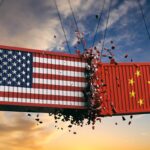U.S. avocado, blueberry industries see potential in Chinese market

The new phase of the U.S.-China deal brings good news for U.S. blueberries, avocados and nectarines. U.S. President Donald Trump signed a partial trade agreement on Jan. 15 which commits China to up its purchase of U.S. goods by US$200 billion in the upcoming year.
As agricultural industries have actively sought Chinese market access - in some cases, for years - they see the development as an opportunity. The fruit industry expressed hope for the outcome of the deal. Various actors said that those involved look forward to continued work to push into the Chinese market.
On behalf of the California Fresh Fruit Association, president Ian LeMay told FreshFruitPortal.com that they are "thankful to the entire administration for reaching this China Phase One trade deal". He added that California fruit "looks forward to continuing negotiating efforts to find a final resolution so that we can ship the freshest fruit to China”.
This doesn't come without complications or questions, though. The Peterson Institute for International Economics found that more than half of U.S. exports would still be subject to retaliatory tariffs. Its analysis of the phase one deal also concluded that "conflicts between aspirations and achievements are almost inevitable".
In theory, such changes will make it easier for U.S. producers to ship to China. What that means for agriculture at this point, then, is that more work is needed. Market access agreements mean that the industries affected will have to look more carefully into negotiations.
Representatives from the blueberry and avocado industries gave us their reactions and outlined expectations for upcoming months.
U.S. blueberries
In the blueberry industry, for instance, executive director of California's Blueberry Commission Todd Sanders told FreshFruitPortal.com that it is critical that the deal is "viable for shipments". To be so, "negotiations will likely need to take place to address any issues" in the currently proposed deal.
"Since the agreement with China officially enters into force in February, we anticipate movement on the agreement will take place around mid-May," detailed Sanders.
The U.S.-China deal specifically dictates that within three months, U.S. and Chinese phytosanitary authorities will work together to import U.S. blueberries into China.
"This is a pretty significant development and good news overall for the industry as this is a market of high priority," he explained.
Since U.S. blueberries do not currently have market access to China and have been working for years to gain entrance, the agreement is big news. President of the North American Blueberry Council (NABC) said in a statement that the industry appreciates "the Trump administration's efforts to reduce trade barriers".
Undoubtedly, "due to the sheer size of the Chinese consumer population, this market would provide significant economic benefit and opportunities to the entire U.S. blueberry industry," detailed Sanders.
With the hopes of sending blueberries to the new market as soon as May, the NABC stated it will "lead the effort" to successfully gain market access in upcoming talks on phytosanitary conditions with China.
Speaking to the current state of the blueberry industry, Sanders went on to tell us that increasing production numbers mean that "it is important that the industry find additional export markets to alleviate some of the pressure on the domestic market". So, having access to the Chinese market comes at an opportune moment.
U.S. China trade for California avocados
The agreement also opens doors for California Hass avocados. Imports of Hass avocados will be allowed within three months of the initial deal.
Ken Melban of the California Avocado Commission gave us insight into what this means for avocados.
"If things fall into place perfectly, it is my understanding that 90 days from January 15, which would be in April, is when we could get access," he explained.
Hass avocados would have to, in that time frame, get packing facilities certified by Chinese officials. It's unclear exactly how long that might take but the industry is hopeful and working hard to make the process quick. To do so, it will "work as ambitiously as possible to get the work done".
This work is nothing new for the California avocado industry since it's been pursuing market access since 2005. The "diligent work" involved in getting agreements to come to fruition came to a halt when the trade war began.
After being "in a state of hiatus", California avocados was "very pleased" when hearing the news on Wednesday.
Regarding the market, Melban said China's customer base "shows tremendous potential". While the market for avocados has competition - New Zealand gained access recently - there is potential for "exponential growth".
"The economic strength of consumers in the upper-middle class is strong and growing," added Melban.
Nuances in the agreement, recent history of trade relations
Considered a truce in the ongoing trade war between the two countries, the new understanding removes impediments for U.S. products ranging from beef, poultry, seafood, dairy and rice to potatoes, avocados and nectarines.
In turn, the U.S. is cutting tariffs for Chinese imports. However, both sides are retaining steep tariffs. Nearly $110bn worth of tariffs imposed on U.S. goods will remain in place. The upside for the blueberry and avocado industries is that the deal allows for tariff exclusions on the goods China wants to buy. Details on what that could mean in practice are unclear.
When the trade relationship first became difficult, U.S. importers absorbed losses as tariffs on Chinese goods increased. Cherries, citrus and apples were most impacted by agreements in June of 2019.
This move is just a first step, reports CNN. Economists and policymakers don't see the agreement as ideal. The document includes an escape clause in the circumstance that either country doesn't play its part in the deal. This specifically involves private companies, stating that if one party thinks the other isn't doing its fair share, the other is able to opt-out of obligations.







































